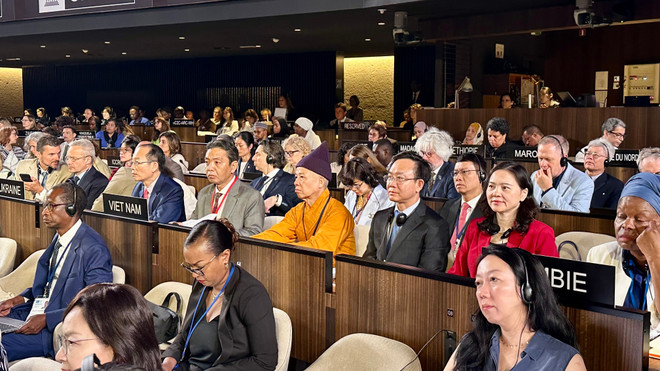UNESCO was founded on November 16, 1945, and Vietnam officially became a member of the organisation in July 1976, marking one of the country’s important steps in the process of global integration.
The 47th session of UNESCO’s World Heritage Committee opens in Paris on July 6 (Photo: VNA)
A Vietnamese delegation, including Standing Deputy Minister of Foreign Affairs Nguyen Minh Vu and Deputy Minister of Culture, Sports and Tourism Hoang Dao Cuong, is attending the 47th session of UNESCO’s World Heritage Committee in Paris from July 6 to 16.
This session, chaired by Bulgaria, holds special significance as the World Heritage Committee will consider the nomination of around 30 new heritage pieces for inscription on the World Heritage List and the extension of two existing ones. Several Vietnamese heritage elements have also been nominated in this session.
Over the 10 working days, the 21 member countries of the committee are expected to decide which sites will be added to the World Heritage List and adopt a number of important decisions related to the conservation and management of existing heritage currently under threat.
One of the key focuses of the session is to assess the conservation status of 248 recognised heritage pieces, including those already on the List of World Heritage in Danger. In addition, the session will introduce necessary measures to protect these from negative impacts of climate change, human activities, and other factors.
 The Vietnamese delegation attends the session (Photo: VNA)
The Vietnamese delegation attends the session (Photo: VNA)In addition to the official sittings, the 47th session also features numerous important side events aimed at promoting understanding and international cooperation in the field of heritage conservation.
UNESCO was founded on November 16, 1945, and Vietnam officially became a member of the organisation in July 1976, marking one of the country’s important steps in the process of global integration.
The UNESCO World Heritage Convention is one of the most widely accepted international conservation treaties, currently ratified by 196 countries. The World Heritage Committee is one of the two governing bodies of the Convention concerning the protection of the world cultural and natural heritage. It is also one of UNESCO’s key governing bodies, with the authority to make crucial decisions related to the recognition of world cultural and natural heritage; to review and assess the conservation status of World Heritage sites worldwide; and to decide on policies, budgets, and development orientations of the World Heritage Convention./.